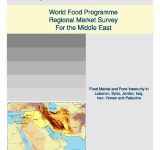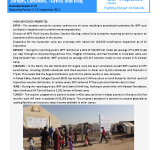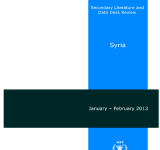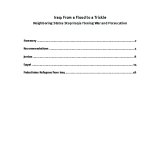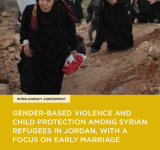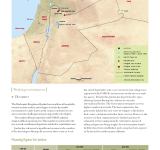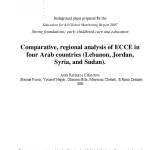Syria
During the reporting period;; World Food Programme (WFP) distributed a total of 340;;000 hot meals (an average of 52;;000 meals per day) through its implementing partners TUA;; Thaghar Al Madina;; and Radi Shedifat in Al Za'atari camp and King Abdullah Park. In addition;; WFP provided an average of 4;;213 welcome meals to new arrivals in Al Za'atari Camp. The following report details such endeavors.
The purpose of this desk review is to uncover the food security and nutrition information available on the three target countries;; to advise WFP on the absence of any relevant information that would prevent a comprehensive evaluation of refugee food security status;; and to provide guidance on areas for primary data collection during the March 2013 Joint Assessment Mission (JAM).
تركز الدراسة على الإجراءات المقيدة الجديدة التي فرضتها كل من مصر والأردن لمنع دخول مزيد من اللاجئين. أما سوريا التي تؤوي زهاء مليون عراقي;; فترفض منح باحثي هيومن رايتس ووتش الذين يريدون توثيق أوضاع اللاجئين تأشيرات دخول إليها. وتقوم المملكة العربية السعودية ببناء سياج مزوّد بتكنولوجيا متقدمة تبلغ كلفته 7 مليار دولار على امتداد حدودها مع العراق لمنع دخول العراقيين;; في حين ترفض الكويت طالبي اللجوء العراقيين رفضاً قاطعاً.
This report is the product of a meeting between The Ministry of Planning and International Cooperation (MOPIC) and the United Nations team regarding displaced Syrians in Jordan. It assesses the overall situation;; along with the humanitarian needs and coping mechanisms of Syrians in Jordan;; and provides a framework for relief interventions.
This report provides an overview of UNHCR operations profile in Jordan in 2013. It includes an summary of the situation of refugees and asylum seekers in Jordan;; their figures and UNHCR's reponse in terms of strategies and projects.
This report provides an overview of UNHCR operations profile in Jordan in 2014. It includes an summary of the situation of refugees and asylum seekers in Jordan;; their figures and UNHCR's reponse in terms of strategies and projects.
This report provides an overview of the status of early childhood care and education (ECCE) in Jordan;; Lebanon;; Sudan;; and Syria. It examines the contextual factors influencing ECCE;; highlighting current policies;; challenges;; and strategies for improvement and expansion. The report underscores the paucity and limitations of available data. Findings show that ECCE services have improved but regional disparity and dominance of the private sector prevail. None of the four countries but Jordan has a full-fledged national strategy and policy on ECCE. Challenges identified include lack of qualified teachers;; societal misconceptions about the unique features of early childhood;; and lack of research-based studies. Innovative projects show that NGOs have been instrumental in addressing the needs of marginalized children.
